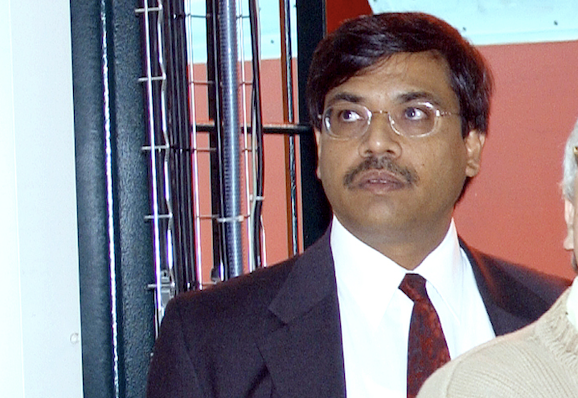Experience and success: interview with Hafeez Hoorani, particle physicist and professor
Fabiola Cacciatore, 07 April 2022
Prof. Hafeez Hoorani (photo courtesy public-archive.web.cern.ch)
For the first time, Pakistan students participated in the International Particle Physics Masterclass programme. It was last March 2022, and among the moderators there was Hafeez Hoorani, one of the most influential personalities in this sector in Pakistan. We could not miss the opportunity to interview him and let us tell his story, but also his vision of what is being done in outreach in Pakistan regarding particle physics.
Mr Hoorani, please tell us about yourself, about your experience as a physicist at CERN.
MH: I joined CERN in 1989 and started to work on the L3 detector at the Large Electron-Positron (LEP) collider. In 1995, I joined CMS in parallel to L3. My work at LEP was related to the measurement of the number of neutrino families, determination of hadronisation parameters, study of two photon physics, the measurement of W-mass and the problem of colour reconnection and the Bose-Einstein Correlations in W decays.
In CMS my focus has been the muon system. I was involved in the R&D and prototyping of the Resistive Plate Chambers (RPC). I established a group and the lab infrastructure in Pakistan for the assembly, testing, and the study of RPCs in Pakistan. Eventually in Pakistan 319 end-cap RPC detectors were constructed and successfully installed in CMS over the period 2005 – 2007. I have been involved in the initial prototyping phase of the CSC detectors that are also used in CMS, in addition I contributed to the development and the construction of GEM detectors.
In CMS my focus in terms of physics analysis was related to the physics of top quarks. The areas that were covered: production of single top, top pairs measuring the top mass, production cross-section. During last 22 years in CMS, I was able supervise 31 students for their research work. At present, I am working as the Deputy System Manager of the Muon System of CMS and am currently based at CERN. Concerning my experience at CERN, I would call it a unique experience of my life.
Working at CERN in science is quite an enriching experience but even more enriching is the cultural experience and great openness towards diversity that has no match elsewhere. CERN truly provides a platform where science is used as the universal language, and it plays the role of bridging the gap between peoples.
For the first time, last 28th March 2022, young people from Pakistan participated in our International Masterclasses. You were one of the moderators, what do you think of how the day went?
MH: I think it was very well organised and the interactive part that was conducted is very useful for students. Generally, as opposed to conventional methods of having a lecture by a person, it is better to have the active involvement of the participants. On this account the International Masterclasses are great and overall, the discussion went very well.
Do you think that the kids through the Masterclasses can feel more motivated to take a career in particle physics?
MH: I am most certain that the students enjoyed it a lot and they will be very motivated to take up a career in particle physics.
IPPOG uses each Experiment’s real data analysis during the masterclasses. Do you think this is a good way to make students feel like "scientists for a day”?
MH: Absolutely
What do you think about the future of outreach in Pakistan regarding particle physics?
MH: In my opinion, we should organise more and more such events and try targeting an even wider audience. In particular we should try to bring female students on board as much as possible.
Filling gaps between boys and girls who decide to undertake studies in particle physics is one of the objectives of IPPOG. Every year, in February, we dedicate masterclasses exclusively to girls who are interested in STEM subjects. Our aim is to inspire many future female scientists and make it clear that science does not look at the genre, but only at passion and curiosity (fundamental values for those who want to work in science research).
There is still a lot of work to be done, but we are sure that in a few years and with excellent outreach and awareness, children will not be afraid to confront science and consider a career in it.


